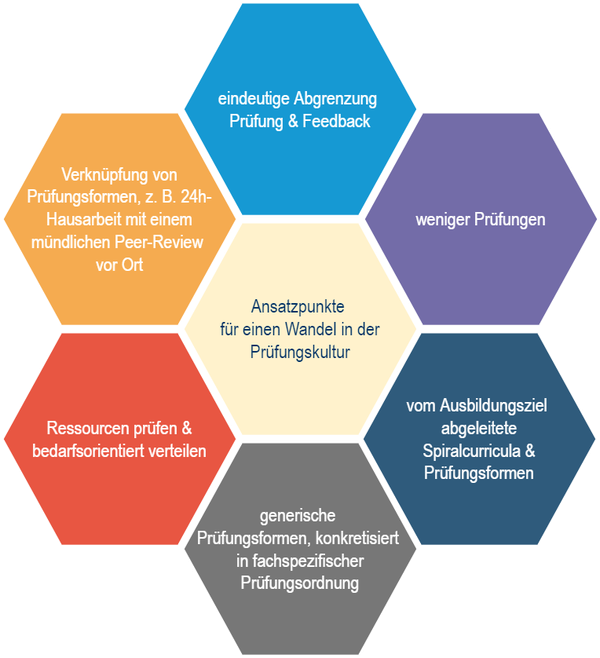Change in examination culture(s)
Particularly at large universities with many departments (faculties), it is clear that there are several parallel examination cultures that are primarily characterised by convictions in the specific subject culture. However, this diversity can also be quickly summarised in terms of written examinations: the dominant forms of examination are written examinations and term papers. However, at the latest since the disruption caused by generative AI (end of 2022), it has become clear that examinations need to change. A change in the examination culture is therefore needed.
In order to create space for audit-relevant innovations, it is necessary to raise awareness of opportunities to change the existing audit culture [Beyer & Erbe 2023, 49]:
-
Abstraction: Examinations should be categorised a) as examinations with legal consequences and b) as feedback without legal consequences. The examination forms of a) should be generically categorised as written, oral or practical examinations, which the respective examination regulations specify in terms of time, space and social requirements.
-
Reduction: The number of examinations with legal consequences should be reduced in order to create space for feedback tasks.
-
Combination: The examinations with legal consequences should be organised in a spiral curriculum and derived from the training objective (fit of content & forms to the objective). In addition, different forms could also be combined within the framework of an examination (blended assessment), so that, for example, a digital remote examination (24-hour homework) is coupled with an oral peer review on site.

At HU Berlin, the topic of examination and feedback culture is centralised in the Teaching Manifesto under the guidelines for good teaching. It states:
3. good teaching utilises a broad spectrum of methods and suitable forms of assessment and is based on a developed feedback culture. [...] Examination culture: In principle, a transparent fit between competence objectives, teaching and learning activities and examination performance must be established. Accordingly, examination forms and formats must also be continuously evaluated and further developed as part of a more comprehensive examination culture.
Digital examinations expand the range of tasks and competences tested. They also offer the potential to increase the efficiency of the assessment process, leaving more time for feedback. In this way, they contribute to a change in the examination culture(s) at HU - in the knowledge that beliefs and practices (can) only change slowly.
From 2023 to 2025, the project Examination in Transition - Digital, Diverse and Democratic (Prüfen 3D) of the Berlin Quality and Innovation Offensive (QIO), which is funded by the Senate, is dedicated to the topic of examination culture at Humboldt-Universität zu Berlin.
As part of the project, a concept was developed for systematically addressing the transformation of examination culture(s) at HU. The concept was published on Zenodo: https://zenodo.org/records/17245575. In addition to an outline of university-specific problems, it comprises three building blocks that build on each other and could initiate the intended change along the PDCA cycle.
Bibliography:
- Budde, J., Eichhorn, J., & Tobor, J. (2024): Vision einer neuen Prüfungskultur (Diskussionspapier No. 28; S. 16). Hochschulforum Digitalisierung (HFD). https://hochschulforumdigitalisierung.de/wp-content/uploads/2024/01/HFD_Diskussionspapier_28_Vision-einer_neuen_Pruefungskultur_final.pdf
- Beyer, A., & Erbe, A. (2023): A-Assessment, B-Assessment, E-Assessment—Prüfungskultur gemeinsam weiterentwickeln. Innovative ePrüfungskonzepte - Neue Ideen und individuelle Lösungen, 48–50. https://doi.org/10.18154/RWTH-2024-01576
- Beyer, A., & Erbe, A. (2023): Poster A-Assessment, B-Assessment, E-Assessment—Prüfungskultur gemeinsam weiterentwickeln. Innovative ePrüfungskonzepte - Neue Ideen und individuelle Lösungen. https://zenodo.org/records/15676183
- Döbler, J. (2019): Prüfungsregime und Prüfungskulturen: Soziologische Beobachtungen zur internen Organisation von Hochschule. Springer Fachmedien. https://doi.org/10.1007/978-3-658-25290-8
- Huber, L., & Reinmann, G. (2019): Vom forschungsnahen zum forschenden Lernen an Hochschulen: Wege der Bildung durch Wissenschaft. Springer Fachmedien. https://doi.org/10.1007/978-3-658-24949-6
- Reinmann, G. (2022): Ungeliebter Druck. Thesen für einen Wandel der Prüfungskultur. Forschung & Lehre, 6, 456–457.
